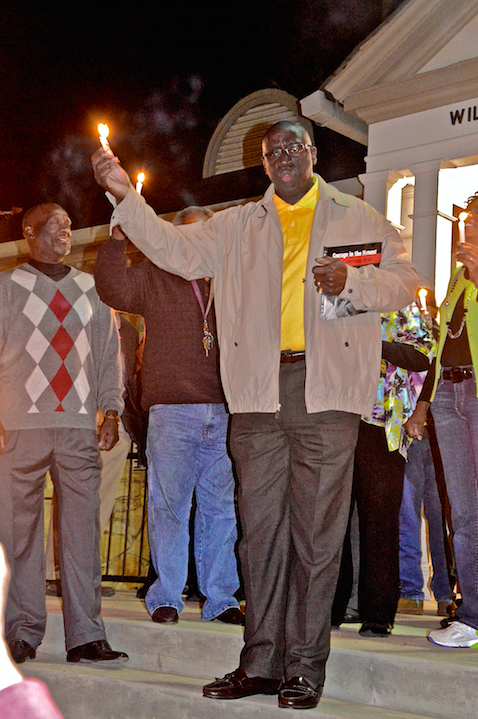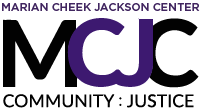
I attended a funeral last week, which was a strange experience for me, because it is the first one I have ever attended. I did not know the person who passed as well as I would have liked to, but she was a massive figure in Northside and the surrounding communities. Her name was Mama Kat. Mama Kat was a woman who regularly volunteered with St. Joseph CME’s Food Ministry (AKA Heavenly Groceries), where food is collected and given to people who otherwise may not be able to afford it. That’s really an understatement though; she was omnipresent. Of the many volunteers that came through the Ministry, most of them recalled getting to know her as one of the most impactful parts of the whole experience. I count myself among them.
The day before the Funeral, the Jackson Center held a meeting, and everyone was asked whether or not we were willing to go to the funeral to show support for the family. I was the only one who hesitated despite half the table being populated with the Center’s other Summer Fellows, many of whom had been working at the Center for a much shorter time than I had, had known Mama Kat for a much shorter time than I had. But I hesitated, and I said, “My concerns are that I have a meeting at three, and I’m not sure I have the right clothes.” I did have a meeting, but I knew that we would be back before then. I knew I had the right clothes, but that was all that came out of my mouth when my real hesitation was that I was terrified at the idea because I did not know how to act at a funeral.
I have trouble coping with the thought of my own mortality, let alone how to properly respect someone who had just crossed beyond the veil. Besides, I didn’t see myself as very religious. I didn’t go to church very much at all growing up, and my interactions with religion had only ever been linked with those who wielded dogma to justify their bigotry, or else quietly went through the motions of faith without truly believing. I didn’t know what to expect, and I didn’t want to embarrass myself.
Della, our former Executive Director looked at me and said, “we will be back by then, and there is no right outfit.”
So the next morning I got up early and donned a white dress shirt and suit jacket I had recently brought back from my hometown on a whim, along with black dress shoes I didn’t know I even owned. I gently fastened a thin black tie around my neck that I had borrowed from a friend a long time ago and never given back since we mutually forgot about it. My entire outfit was an accident, some sort of serendipity that I started off that morning struggling to rectify. Had things been slightly different I wouldn’t have had that outfit.
We got into the car and drove out to the chapel in the country. Looking out at the woods as we passed by, they reminded me of the mountains and the pine forests which have surrounded the homes I have known in my life. We made small talk on the way and remembered Mama Kat’s life. I wished I had more to say, and I wished I had known her better. I wished I had put in the work to know her more before she passed.
We talked about how fortunate it was that The Jackson Center had preserved so many Oral Histories of Mama Kat, so that even though she had passed, her words would not be lost. Even though she was gone, her spirit could not be extinguished and would continue to live on in the hearts of those who remembered her voice and the ears of those future children who might know her through the stories we had saved.
When we arrived at the funeral, I was still anxious. Most of the people there had known Mama Kat for much of her life, were related to her, or worked with her. I was a just a white guy in a suit that no one knew, who had hardly ever been to church in his life, who didn’t believe in God, or in the Heaven that Mama Kat’s family knew she was cutting up in right as they spoke.
We walked in and through the beautiful church, and it was mostly already full. Soon enough we were ushered downstairs to the Fellowship Hall to watch the funeral on a television feed. Part of me had wanted to just stand against the wall for the whole ceremony rather than watch it on the television, but I knew there were more people coming in and there would almost certainly be people closer to Mama Kat than me who would have to watch on the television screen as well, so I just resolved to be present and listen.
To my surprise, all through the ceremony I couldn’t help but feel connected to it emotionally in ways I couldn’t really articulate. When I saw people walk over to the casket during the visitation and clutch the side of the box while staring down at their loved one, I felt that anguish and memory. When the church broke into song between speakers I wondered why I had to all but stop myself from singing along. Perhaps I should have sung along, but I didn’t know the words, and the basement overflow was not full of the singing and clapping that took place overhead.
But these feelings moving through me, this inarticulate connection, was only a dull hum compared to how I felt watching the pastor come to the altar and preach. He spoke of Mama Kat, of her work, of her character, and most importantly of the power of faith. Even all the caricatures of poor sermons in the world, full of hollow repeated verses and over worn Bible passages, could not have prepared me for the sheer power of someone using the text as a means for conveying their belief rather than someone speaking the same words as meaningless ritual. It was as if he were giving a speech through poetry as common prose, no matter how carefully chosen, would be unable to do the job. It felt as if something would be lost in those phrases like the energy between the words, the power of the lyric, or the context of the passage.
And so I wondered, a young man in an unfamiliar chapel who had never so much as stepped in a church since the age of six, why I felt myself on the verge of tears when the pastor proffered that “faith without works is dead.” Why was I shaken by the hymns? Why did my hands tremble at the sight of someone I had hardly known passing beyond this world?
I’m sure that many religious people might say that the power of the divine was affecting me, and I do not necessarily disagree. Many might say that I felt the awe of God.
But, despite my feelings, I grew up never believing in God, and I still cannot square my experiences with the existence of a God. So I’m left wondering what I do believe in.
Later that week I listened to another oral history we have in the archive at the Jackson Center. In it, the narrator speaks often about how he lets God use him, how he is often compelled to see and do things by something he feels is outside of himself; the power of God.
Strangely, the feeling is very familiar. The way he talked about being used by God sounded to me like the time I went to a protest and felt compelled to join the other activists in blocking an intersection. So filled with purpose was I at the time that looking back, the thought had not even crossed my mind that the action could have resulted in my being hit by a car or arrested. The way he talked about being used by God reminded me of how I felt when I had my first kiss, inconsiderate of anything other than the moment. The way he talked about being used by God reminded me of all the times I have reached out to someone I knew would have no time for me, but made time anyway. The way he talked about being used by God reminded me of how I have felt every time I have been brave in my life; every moment I made a decision I knew was right in my heart, in my bones, without being able to explain why.
How do I explain those moments to myself?
The short answer is that right now, I’m not sure.
What I do know is that those moments are necessary, that faith is necessary. Faith is in the bold, faith is in the world changing. True faith is inseparable from creating tangible change, because both rely on a suspension of material understanding in order to believe in a reality that is greater than the one currently experienced. How could protesting Candy-Coated Racism and sitting down in segregated stores, knowing you might get beaten by police or pummeled with a fire hose in order to secure a more just future that you can scarcely imagine, be that much different than having the courage to continue living devoutly through strife in order to live on eternally in a Heaven one can scarcely imagine?
Faith and Revolution have been long separated in the Western ideological canon, from the Cult of Reason to elitist critiques of the Civil Rights Movement, but I am beginning to think that this is a foolish error.
When that pastor said that Faith Without Works is Dead, he meant that it was not enough to believe in something without acting to better the lives of your brothers and sisters. Faith unmoored from a genuine mission to enrich the lives of others is hollow and vain. I would like to posit that the reverse is true. Works without faith are precarious.
The challenges facing this generation are colossal, are bigger than ourselves, and are so big that it is hard to feel like we are making any difference in changing them. People simply cannot understand the numbers of the big picture, you can’t visualize 3,000 tons of garbage. What we can visualize is our story, and what we want the world to look like in thirty years. Those who care most about creating a better world for our children, given a material understanding of our circumstances, are some of the most highly affected by anxiety, depression, and attention disorders. We are burnt out. We are tired. We are constantly second-guessing ourselves.
So often, our intense work is matched by an unrelenting nihilism that despite our efforts, things will never be better materially, and there is certainly no such thing as a life beyond this life where they will be better. But we need to believe that change is possible, that a better world is possible, because that faith is what keeps the lamp alight when all the other fuel has run out. For me, I think this means that my generation and activists writ large need to need to rediscover faith, a faith that feels authentic and true in our bones if not our heads. We need to decolonize ourselves and recognize that sometimes things can be true without being provable, at least on a personal level, even if that truth is not the existence of a God. And most importantly we need to feel genuinely that faith is radical, and radicals must have faith.
Faith without Works is Dead
Works without Faith don’t Last
— Wyatt Woodson

Leave a Reply